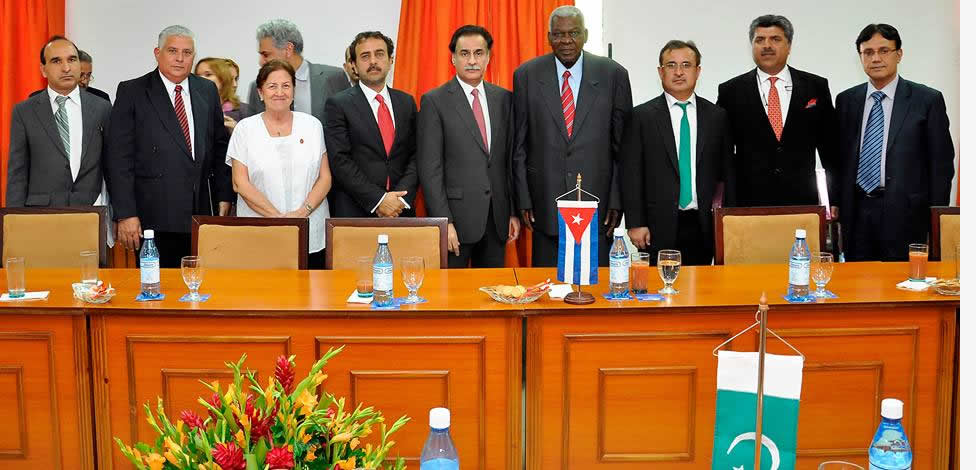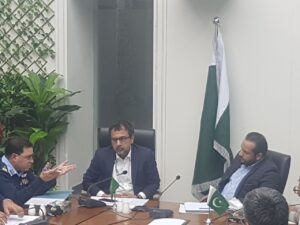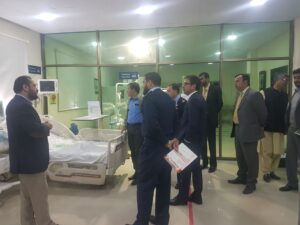I was in the most remote area of my constituency in Dera Ghazi Khan when I received a call from the speaker of the National Assembly who informed me I was part of a delegation to Cuba. This was the first time since this parliament took oath in 2013 that I was made part of a foreign delegation.
My first reaction: Why Cuba? This question was to be answered in the coming days during the most interesting foreign working trip I have been on in the last 17 years of my career as a parliamentarian. After all, what I knew of Cuba entailed only Che Guevara, Fidel Castro, the Cuban Missile Crisis of 1962 and the wonderful health programme of the country that even developed countries of the west are enamoured by. We were three parliamentarians in all, besides the speaker – Ijaz Khan Jakrani, chief whip PPP, Syed Ghulam Mustafa Shah, chairman Standing Committee on Ports and Shipping and myself – along with the Secretary of the National Assembly, Riaz Khan and DG Protocol National Assembly, Anwar Sial.
It was a never-ending flight to Santiago and Havana despite the fact that we had a one-day stop in Madrid where we had day-long hectic meetings with Elcano – a prestigious think tank that advises the foreign ministry of Spain. The Policy Institute associated with the Foreign Office in Islamabad should see how world class institutes are helping shape the foreign policy of advanced European nations. It was refreshing to see our delegation press upon Spain the issue of Kashmir and the non-transparent attitude and actions of India in the region. Spain’s recognition of our stance was indeed an achievement.
Some serious issues concerning Pakistanis living in Spain were raised effectively before the Spanish Authorities by our Speaker Sardar Ayaz Sadiq. Consequently, they promised to consider improving the conditions of hardworking Pakistani immigrants and workers. We must remember that these Pakistanis are playing a very important role for Pakistan’s economy by sending substantial amounts of remittances back home.
The next day we boarded Cubana which took us all the way to Santiago (a small place in Cuba) and then a small hop onwards to Havana. As we boarded the flight, we realised that the plane was completely empty and we thought we would be the only passengers. VIPs are made to board the plane first, so they have space to keep their cabin baggage comfortably since those who board last can’t find any space in the overhead compartments. The Russian aircraft had a huge wingspan and climbed up effortlessly as it flew towards Cuba, a country that has defied the might of the United States for over half a century. Even the great Soviet Union succumbed and Balkanised into many states more than two decades ago but this Socialist country is going on and on. And they are surely good at maintaining beautiful antique American-made cars at a cost that is lower than any in the world. Some friends who had visited Cuba had told me of a feeling they got when there –of going back into time, as if it had stopped a good 50 years ago.
We landed at the Santiago airport and were in transit for about an hour. The hall we sat in reminded me of Multan airport of the early 80s. We reached Havana airport at about one in the morning where we were welcomed by a member of parliament, protocol officers and Pakistan Embassy’s Charge de affairs, Naeem Khan. We were at our hotel within an hour of landing at Havana. Exhausted beyond imagination, one could still appreciate the amazing character of the hotel where we were put up by the Cuban government. Gradually, I observed nuances of the colonial era while walking through the grand hotel. It reminded me of the stories we used to hear about old colonial hotels from our elders.
After getting hardly five hours of sleep we were at work again. The next three days were packed with meetings with hardly half a day available to somewhat experience the real Cuba, whose people are proud of whatever they have stuck by so far and know how to party and keep happy – finding solace in what they claim to be ‘the best rum’ in the world.
Our first meeting was with the President of the National Assembly of People’s Power, Juan Esteban Lazo. The dignified old gentleman received us himself along with his deputies and after exchanging niceties we started exploring the Cuban political mindset. He talked of change, saying: “More than 95 percent of the GDP of Cuba is produced by the state. We need to change that. Not to create wealth but to exploit productive resources. We want to receive more money through taxes from businesses and increase exports. We expect more than 45 percent GDP to be produced by the private sector in the next four to five years. New tax laws have to be passed and we have to change the constitution radically to create space for economic reforms to take effect”.
One of his deputies, in charge of legislation, was also introduced to us in the meeting. He looked under severe work load and the jolly old president could not resist remarking on that in a humorous way. He termed it a “difficult and tedious task” and was adamant on, “Maintaining the basic structure of the Socialist constitution while opening the economy to bring in market reforms”. A model that surely has serious contradictions.
He talked of “Fighting for every single thing that benefits people, who are more important than ideology”. This came up when talking of the huge footprint that Cuba has placed globally in terms of aid they extend during catastrophes and natural disasters. Compared to developed countries like the US or Japan, Cuba has much less but their magnanimity entails much more than developed countries offer during natural disasters. We witnessed that magnanimity during the earthquake in Pakistan.
As he appreciated the youthful energy of the oldest female member who was present in the meeting, we came to know the importance of gender equality – a very important part of Cuban culture that revolves around the principles of the ‘revolution’. He talked of Cubans “loving women and not being scared of them. We fought in the revolution for the equality of men and women in society. They work as much as we do. The only thing they have not achieved is making us work at home”.
The meeting concluded and we had a working lunch with lobster and shrimps at the State Guest House, which had beautifully manicured gardens. Lobster is one of the biggest export items of Cuba and is imported by countries who dare to do trade with Cuba.
During the four days that we were there, we found out that Cuba has a very strong local government system that boasts more than 1,400 local governments for a population of not more than 11.5 million. The director general of WHO has called Cuban healthcare as “the best in the world and a model for all third-world countries to follow”.
This least cost preventive healthcare system, which has brought down infant mortality to four out of 1000 in Cuba, has also increased life expectancy from 62 to 78.5 years. This socialist country has a 100 percent literacy rate. Health and education have a share of over 12 percent each of GDP. And please note that these healthcare and education systems are run by none other than the local councils.
God only knows when we will learn to trust our local councils and transfer authority from the ‘babu’ to the local councillor. I’m sure they will have a learning curve, but they will learn much quicker and better since it is their children who would have to be treated and taught in local institutions. We will have to take the plunge of transferring real power, not to MPAs and MNAs but to the last tier of elected representatives. And whoever does it first will be remembered in history as a leader unmatched in his or her contribution in making a ‘Real Pakistan’, not a ‘New Pakistan’ that certain ‘star’ politcians are offering to the people today through dharnas.
Our meeting with the Foreign Minister, Bruno Rodriguez Parrilla – a Bill Gates lookalike – took place in a grand historic building that had been renovated recently and houses the foreign ministry. It showed signs of change in the thinking of the Cuban people and government. An appetite to normalise relations with the United States was also evident from the remarks of the minister as he fondly remembered President Obama expressing his intent of normalising relations with Cuba. He termed the environment as being more favourable due to less political rhetoric and no possibility of a military conflict – something that India and Pakistan should learn from.
The minister was very clear, as was the president of the Cuban Congress, when they spoke of talking to the Americans on equal grounds and with dignity and self-respect. This attitude and patience in striking a good deal with dignity was something that gives the Cuban people a sense of recognition and pride that has sustained them through embargos and unfair economic terms in the global economy.
“The American government and people should end the embargo sooner than later”. These were the words of an American lady I had a chat with, while having breakfast in the beautiful verandah of Hotel Nacional, overlooking the deep blue sea. At present American tourists have to travel via other countries to visit Cuba.
In what was a great diplomatic initiative by Speaker Ayaz Sadiq, he offered to mediate between Cuba and the United States through the US ambassador in Islamabad. The offer was very positively taken by the Cuban foreign minister who requested Sardar Ayaz to do so. Our delegation also met with Vice President Miguel Diaz-Canel Bermudez. He expressed warm sentiments about Pakistan and resolved to focus on taking our bilateral relations to a new level through investments in Cuba and cooperation in the human resource and health sectors.
There seemed to be a very strong desire to improve Cuba’s relations with the world, including the US, and for economic reforms in the country. Cuba clearly wants to transform. The vice president was also quite proud of the close cooperation they have amongst blocks of different South American countries that have ‘sovereign’ foreign policymaking.
The most meaningful and touching meeting was at the Central Unit of Collaboration where we met with doctors who had left their homes and families thousands of miles away for more than six months, to stand by the poor and needy in Pakistan in the bitter cold after the earthquake in 2005, at a time when most international agencies had left. I saw tears in Doctor La’zara Caridad’s eyes when she was narrating her story about Pakistan. She said nostalgically, “I don’t know how to express my feelings for a loving people like those in Pakistan. If we are told to return to Pakistan, we will return gladly.”
Intensive care specialist Jorse Fonseca Cabreja said he “worked day and night to set up a field hospital. People opened their hearts for us. Friendship emerged that touched our hearts. When we left, we left our hearts. We had chemistry. We are at your disposal”.
It was the most emotional interaction I have seen among people of two different nations that are separated by an air journey that took these doctors more than 48 hours during the earthquake days. When we interacted with Pakistani students who are about to become doctors in Cuban medical colleges, I urged them to not only get degrees from there but also to learn how to be as committed as the Cuban doctors are, to the cause of improving the health of their people better than anyone else’s.
Pakistani students were committed in doing so, but were petrified since the PMDC and the Higher Education Commission have not even accredited the degrees that they have worked for over eight years. Can you imagine that? Resource-starved Cuba, having spent more than 80 million dollars and our children having spent more than eight years of their youth, and our inefficient PMDC does not even care! That is our way to reciprocate. That is Pakistan in comparison to Cuba.
Cuba is changing. Let us all encourage change and help them change the right way instead of pushing them into isolation. I talked to the young boys and girls and I could see a light in their eyes: a light that reflects the appetite for change. Fortunately the rulers know and realise that there is no other way but change. Whether they do it the right way or not is yet to be seen. But they surely have the most important element in society to do it the right way – an educated workforce.
The writer is the chairman of the National Assembly’s Standing Committee on Foreign Affairs.
Links to original publication:
Part I – http://www.thenews.com.pk/print/17339-cuba-the-unexplored-frontier
Part II – http://www.thenews.com.pk/print/17556-cuba-the-unexplored-frontier





